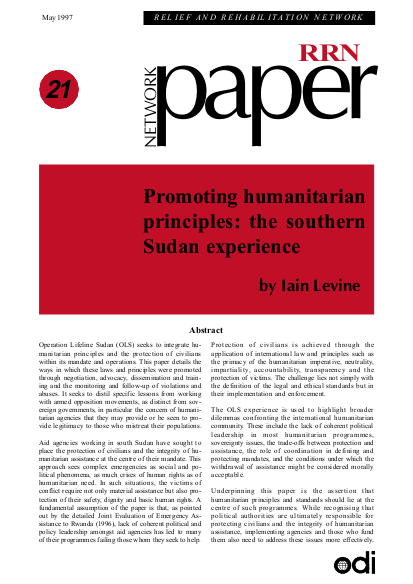The Southern Sudan Experience

Operation Lifeline Sudan (OLS) seeks to integrate humanitarian
principles and the protection of civilians within its mandate and operations. This paper details the ways in which these laws and principles were promoted through negotiation, advocacy, dissemination and training and the monitoring and follow-up of violations and abuses. It seeks to distil specific lessons from working with armed opposition movements, as distinct from sovereign governments, in particular the concern of humanitarian agencies that they may provide or be seen to provide legitimacy to those who mistreat their populations.
1. Background 4
1.1 Complex emergencies and dilemmas for humanitarian agencies 4
1.2 The south Sudanese context 5
2. South Sudan and threats to humanitarianism 8
2.1 Denial of access 8
2.2 Human rights abuse 8
2.3 Misuse of humanitarian assistance 8
2.4 Threats to the security of humanitarian workers 9
2.5 Neutrality and impartiality 9
2.6 Distinction between military and civilians 9
2.7 Specific problems of working in areas controlled by non-state entities 9
2.8 Threats to humanitarian assistance: conclusion 10
3. Ground Rules and humanitarian principles 11
3.1 Ground Rules as a framework for collaboration 11
3.2 Objectives of the OLS humanitarian principles programme 12
3.3 Principles upon which the Ground Rules are based 13
3.4 Negotiating the Ground Rules 14
4. Implementation 15
4.1 What is the underlying approach? 15
4.2 Promoting humanitarian principles 18
4.3 Capacity building 20
4.4 Monitoring 21
4.5 Follow-up to Ground Rules violations 21
5. Issues and Implications 23
5.1 Successes 23
5.2 Continuing problems 23
5.3 Lessons for humanitarian agencies and for other complex emergencies:
some tentative conclusions 24